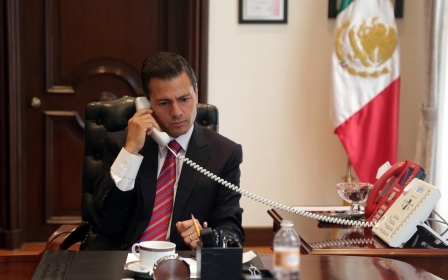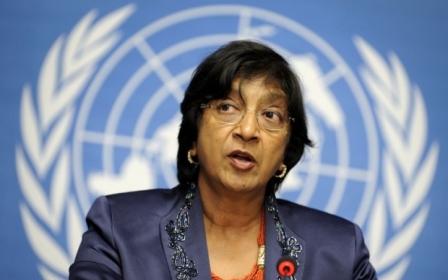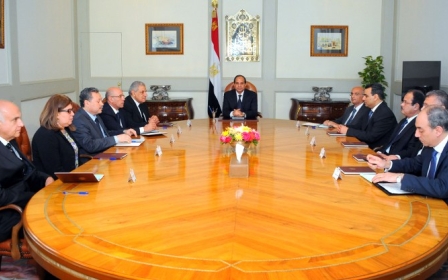Egyptian defence officials in London to meet government: Reports

Egyptian newspapers reported on Tuesday that a delegation from the Egyptian ministry of defence, headed by chief of army staff Mahmoud Hegazy, will be visiting its British counterpart in London on Wednesday.
“Hegazy is leading a delegation of high officials on a formal visit to London for a few days. The delegation will be discussing several high priority issues with British officials,” said Egyptian Elwatan newspaper.
Interim Egyptian president Adly Mansour appointed Hegazy as the new armed forces chief of staff last March. Hegazy had previously held the position of head of the military intelligence services at the time, and would succeed the current Egyptian minister of defence, Sedki Sobhi, if he leaves his position.
In August, Hegazy reportedly met a delegation of British security officials headed by Sir John Jenkins, the former British ambassador to Saudi Arabia who led a UK investigation into the activities and ideology of the Muslim Brotherhood last year.
The British Ministry of Defence did not respond to Middle East Eye's inquiries about Wednesday's visit.
But according to reports, Egyptian and British officials will be discussing bilateral security and military coordination and efforts to fight “terrorism” and ensure peace in the region, Elwatan reported.
Toby Cadman, a barrister at the Nine Bedford Row International Chambers of London who has also advised several groups involved in Egypt, told MEE that Wednesday's visit highlights continuing bilateral ties that should cause apprehension.
"As with the invitation to [Egyptian president Abdel Fattah] al-Sisi [to London], it is of concern that the British Government is seeking to strengthen ties and give an apparent air of normality to a regime that stole power from its citizens and has embarked on a programme of autocracy and oppression," Cadman said.
He said the willingness of the UK government to continue to supply arms to "a regime subject to demonstrable allegations of crimes against humanity is of significant concern.
"The Ministry of Defence should refuse to continue to supply Egypt and, for that matter, all oppressive regimes, with arms until significant reforms have been put in place, and democratic rights restored to citizens."
Sisi’s anticipated visit
Earlier this month in London, Egyptian Minister of Foreign Affairs Sameh Shoukry and UK Foreign Secretary Philip Hammond reportedly discussed an anticipated visit by Egyptian President Sisi to the UK following British PM David Cameron's invitation in June which came just a day after Mohamed Morsi's name was added to the list of death sentences handed down in Egypt.
Human rights lawyers have suggested that Sisi's visit has been delayed because senior Egyptian officials could face arrest for crimes against humanity when they visit London.
Spokespeople for the UK Foreign Office have said that Sisi's visit was expected to take place before the end of the year, but an exact date does not appear to have been set.
In June, the British army provided 31 Egyptian army officers with two-week training exercises on protection from improvised explosive devices, reported Egyptian newspaper Aswatmasriya.
Human rights violations
Several initiatives have been launched to bring members of the Egyptian authorities to justice on allegations of human rights violations including torture, arbitrary detention and abuse of basic freedoms.
A report published by Human Rights Watch last August called for the investigation of several senior members of the Sisi government following a year-long investigation into the 14 August 2013 Rabaa massacre which saw the killing of at least 1,000 protesters, mostly members of the Muslim Brotherhood, by security personnel.
In addition to the 14 August dispersal of the protesters in Rabaa Square, the HRW investigation also looked into human rights violations carried out against demonstrators on four other occasions - 5 July, 8 July, 27 July and 16 August. The investigation drew patterns and correlations between Egyptian authorities’ conduct throughout this period and concluded that the state unlawfully supressed demonstrations.
Commenting on the report at the time, international lawyers said that its findings could be used to hold the Egyptian authorities accountable for crimes against humanity.
“Human Rights Watch reports generally have a great deal of credibility; it is something that lawyers will be able to use in ensuring a process of accountability in Egypt,” Cadman said when the report was released.
“The report will probably further advance those discussions investigating Sisi and his regime on charges of crimes against humanity.”
Middle East Eye propose une couverture et une analyse indépendantes et incomparables du Moyen-Orient, de l’Afrique du Nord et d’autres régions du monde. Pour en savoir plus sur la reprise de ce contenu et les frais qui s’appliquent, veuillez remplir ce formulaire [en anglais]. Pour en savoir plus sur MEE, cliquez ici [en anglais].




